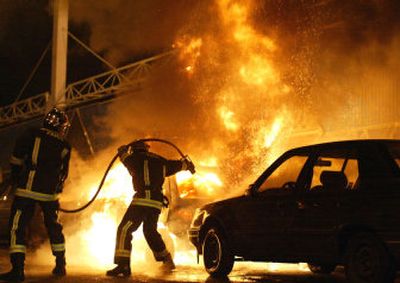French riots fueled by word choice

BONDY, France – It would be an exaggeration to blame the riots that have swept France on a poor choice of words, but Nicolas Sarkozy, the country’s tough-talking interior minister, hardly helped when he characterized the young men responsible for the violence as “la racaille.”
The rough translation is “scum.”
The word is thoroughly offensive, and it personalized the antagonism between the government and the angry young men from immigrant neighborhoods who have been so enthusiastically attacking its authority for the last two weeks.
“It was an outrageous thing to say. If I were the president of France, I would have fired the guy,” said Brigitte Fouvez, deputy mayor of Bondy, a working-class suburb of Paris that has been hit by the swelling violence.
“If I were a young guy living in the neighborhood, not a delinquent, and if the interior minister considers all young men in the neighborhood to be racaille, I can understand the anger,” said Michel Wierviorka, a sociologist who has written a book on political violence. Police officers, teachers, shopkeepers and other adults in the community often refer to these young men as des voyous, a gentler expression that means “louts” or “rascals.”
But who are they really?
For the most part they are French citizens, the second- and third-generation offspring of North African immigrants who began pouring into France in the 1970s.
Their parents and grandparents came to work in factories, or to take the menial jobs no one else wanted. It was assumed that their presence in France would be temporary. They were sent to live in dreary housing projects on the margins of urban areas, and they never left.
A few working-class white families were also housed in the projects, known here as cites, but most of these have left. In recent years, large numbers of black African immigrants have moved in.
Bondy is fairly typical of these communities. Its 48,000 inhabitants come from 65 countries but mainly from North Africa. In overwhelmingly Catholic France, about 70 percent of Bondy’s residents are Muslim.
The cites also are home to soaring crime and to the country’s highest unemployment rates.
Youssef Akdim, 20, a rap musician with a growing following among young residents of the cites, grew up in Bondy. His family moved here when he was 5. His grandfather, along with many thousands of other Moroccans, had been a conscript in the French army during World War II; his father was recruited to work in an auto factory in France.
“They came and they looked at his teeth, they felt the muscles in his shoulders, and they gave him a job,” said Akdim, who is acutely conscious of his father’s humiliations.
Akdim’s school, along with just about every other public building in France, prominently displays the credo of the vaunted French social model: Liberte, egalite, fraternite.
It means that all French citizens are considered equally French. There are no distinctions for race, religion or ethnicity.
“The problem,” according to Wierviorka, the sociologist, “is that the institutions in charge of this idea don’t translate it into reality. The republic has promised a lot, but it has given them nothing.”
Like the worst urban school systems in the United States, the schools in the French immigrant communities simply pass the students through.
“The kids understand that they are pariahs,” a young teacher named Pascal Odin told the newspaper Liberation this week. “They don’t identify with France or the French nation; they identify with their stairwell.” He was referring to the dimly lit communal stairwells in the housing projects that are often the only places young people have to congregate.
Akdim said he was not surprised when Sarkozy, who hopes to succeed Jacques Chirac as president, referred to the young people of suburbs as racaille.
“He was only saying what most people think,” said the soft-spoken young man. “We hear the insults everyday. Sometimes it’s just the look in a person’s eye. Other times it’s the click of a car’s central lock when we walk down the street.”
Most officials and commentators agree that the riots now erupting across France have been 30 years in the making. But the spark was an incident two weeks ago in which two teenagers from an immigrant community were electrocuted when they tried to hide from police in a power substation in the neighboring suburb of Clichy-sous-Bois.
“Riots occur when there is a strong feeling of injustice. Remember Los Angeles,” said Wierviorka, referring to the 1992 riots in Los Angeles that left more than 50 dead. “It didn’t start with the Rodney King beating; it started when a jury said the police were not guilty.”
The rioting on the outskirts of Paris didn’t begin until a local prosecutor said it appeared the police were not to blame for the deaths of the two teenagers.
The violence spread with breathtaking speed, catching both the government and the police flatfooted.
Nightly television images of burning cars have fueled the young perpetrators’ sense of triumph and power. Internet blogs have helped them incite others to join and to spread the unrest from city to city.
Mahmoud Bourassi, 30, a social worker in Bondy, said that burning cars has turned into a competition. “The different gangs try to outdo each other,” he said.
Because an overwhelming majority of the youths involved in the violence and vandalism are Muslim, some commentators have characterized it as yet another manifestation of the “clash of civilizations” that lead to terror bombings in London and Madrid as well as the Sept. 11 attacks in the United States.
Bourassi disagrees. “This is absolutely not about Islam. It’s not some kind of religious war. It’s a political problem that needs a political solution.”